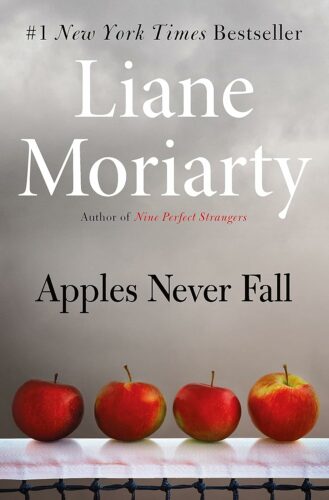 When Dreams Die
When Dreams Die
Author: Liana Moriarty
I recently discovered, and fell in love with, Liane Moriarty. She has a way of stepping into normal life situations and unraveling the yearnings and failings of the heart, peeling back the layers of pretense to reveal the raw heart of a character.
In Apples Never Fall, Stan and Joy appear to have the perfect marriage, at least to those on the outside. Before retiring, they ran a successful tennis academy. Tennis – the battling on the courts, the challenges and last-minute skill-defying successes, the dreams of Wimbledon – shaped their lives and dreams and the lives and dreams of their four children, all of whom avoid professional tennis now. It’s almost as if the picture-perfect family’s obsession drove a wedge between them all. It’s almost like they can’t stand each other now.
Now retired, Stan and Joy are bereft of tennis; without their addiction, the cracks in their relationship are starting to grow and widen. When a random girl arrives at their door late one night, bloodied and crying and looking for refuge from her abusive boyfriend, it seems like the perfect second chance. A second chance at a pseudo child, a second chance at meaning, a second chance at connection. But the Delaney’s real children – Amy, Logan, Troy, and Brooke – have their suspicions about this new girl. They also have their doubts and their jealousies.
Apples Never Fall is, as with all Moriarty tales, a slow burn. It switches between the viewpoints of the four children, Joy, Stan, and the strange girl (Savannah). There is nothing explosive here. It’s more about the jealousies and hurts of a lifetime, the subtle interactions and secrets, the day to day backlit by the extraordinary. You see, Savannah has left, Joy has disappeared, and the police think Stan had something to do with it. The evidence is not looking good, and the children’s loyalties are split. Should they protect their dad, no matter what? Or should they do everything and reveal everything to find their mom, even if that means their dad is accused of murder?
What Worked

Image by Thierry Milherou from Pixabay
The actions and interactions between the characters, the look into their everyday lives and problems, and the conversational, real-person feel of the narrative makes the characters (except for Stan and Savannah – but more on that later) truly come alive. It takes talent to make the mundane of everyday life and grief shine. We build connections through reading and become truly invested in what is admittedly a huge number of people. We care about their dreams, their relationships, their doubts, and even their pain. It’s all a bit haphazard, but I couldn’t help but become involved, be soothed by the writing and the magic of real relationships that Moriarty excels at conveying.
I also enjoyed the way that the parents’ dream becomes rancid. This gift they think they are giving their children is actually a curse because of their obsession. The children all hate tennis now, and a constant friction exists between them and their judgmental father. It’s not about tennis at all, really, but about parental expectations, about forcing your own dream onto someone else, about taking the joy out of an activity by trying to perfect it and “dream big” when you should just engage with your children. This lesson is well conveyed, and the heart of the matter is touching. Readers cannot help but apply this scenario to other elements in life. Again, it’s not about tennis, but about the corruption of something innocent into an obsession that drives others away.
What Could Have Been Better

Image by congerdesign from Pixabay
The reason behind Savannah’s seemingly random entry into the Delaney’s life is a ridiculous plot device. Couldn’t this have been done better? All her rage, all her anger at this family, is over nothing. It’s more insane than earned and devalues the story. Once we get the big reveal, we cease to believe it. We move away from the story. Really? This is the reason for the chaos? This!?
And then, the chaos shifts and Joy disappears. The entire narrative is built around a did-Stan-or-did-he-not murder his wife? The children are torn, half of them wanting to cover for dear-old-dad and half of them wanting justice for mom. What really happened though is as mundane (and frankly stupid) as possible. It’s ANOTHER plot device. When the characters come together, laughing, to realize what really happened, it’s hard not to launch the book across the room. Dad finds out his kids though he was a murderer, but hey, that’s ok, family time! Kids find out where mom really was, but hey, that’s ok, we all learned a lovely lesson. Just, what??? No. NOOOOOOO. This carefully crafted novel deserved way better than this scattershot ending. It reeks of bad plotting, of laziness. After all we’ve been through, our two great reveals are this rubbish?
Conclusion
I loved the writing, the journey, the feel of Moriarty’s character-centric stories, and so, I still enjoyed Apples Never Fall, even though I desperately wanted some whiteout at times. My addiction remains strong (perhaps I didn’t learn from the tennis metaphor?), and I will be back for more Moriarty. Even when she is phoning it in (as with these “reveals”) she is still captivating and magical.
– Frances Carden
Follow my reviews on Twitter at: https://twitter.com/xombie_mistress
Follow my reviews on Facebook at: https://www.facebook.com/FrancesReviews
- Book Vs Movie: The Shining - April 6, 2020
- Thankful For Great Cozy Mysteries - December 13, 2019
- Cozy Mysteries for a Perfect Fall - October 20, 2019


